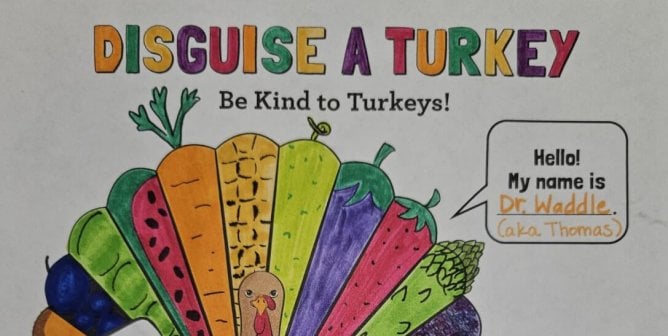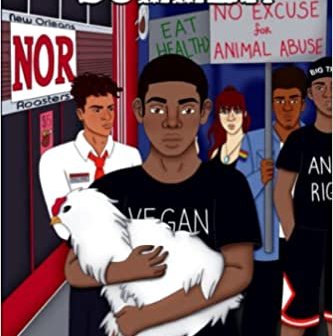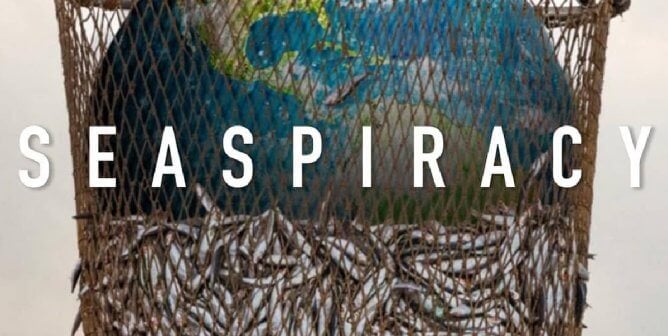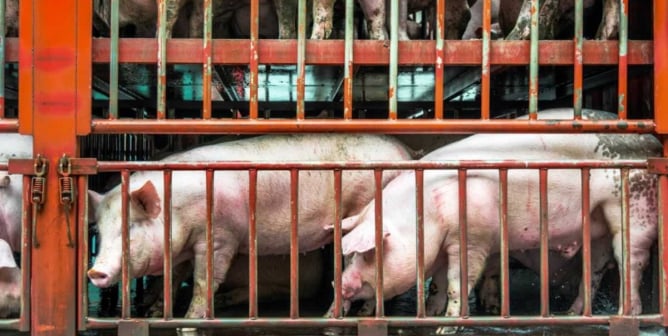FFA and 4-H: Teaching Kids to Harden Their Hearts
School is supposed to be a place where children go to learn valuable information and life skills that will help them become kind, productive members of society. But when schools offer animal agriculture programs, including through groups such as 4-H and the National FFA Organization (FFA), they become places that teach children to abuse and exploit animals for awards, accolades, and money. The animals used in these programs are typically doomed to one of two heartbreaking fates: to be sold at auction for slaughter or to be used as “breeders” (and likely sent to slaughter once their bodies give out and they’re no longer profitable). These programs teach children the harmful message that it’s acceptable to send their animal friends—even if they’ve cared for and bonded with them for months—to violent, terrifying deaths at slaughterhouses.
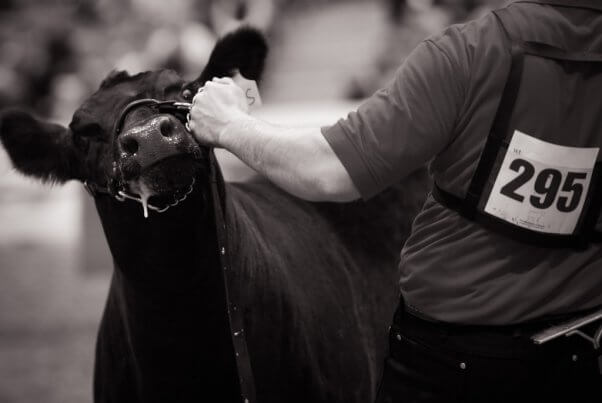
We know that many young people join FFA or 4-H programs because they’re interested in animals—but the goals of these programs demand that children develop a harmful disconnect from those very animals, and the consequences are detrimental to everyone involved.
Here’s why agriculture programs that use live animals, such as FFA and 4-H, have no place in schools:
They Foster Callousness Toward Living Beings
4-H encourages members to raise animals for “projects.” Even in the beginning stages of these projects, members are instructed to “identify parts of [their] animal and cuts of meat”—desensitizing young people to the fact that these living beings are worth more than their parts. Students learn how to care for the animals during this time, but let’s not forget that they’re being taught to take care of them in a way that will bring in the most profit and win a competition.
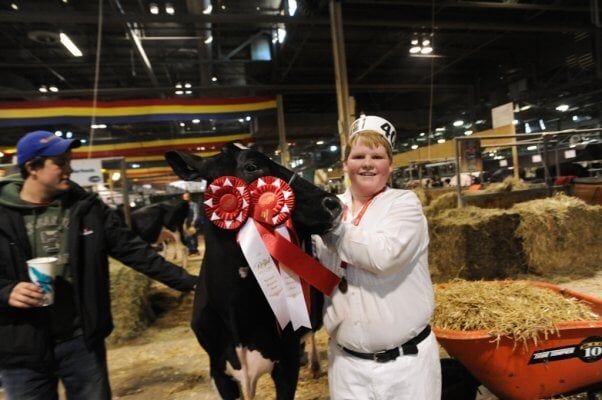
Instead of teaching kids that animals are individuals who have unique personalities, needs, and feelings, these programs teach them to view their fellow animals as nothing more than a way to make money. They’re told to celebrate as their friend is auctioned off to the highest bidder. Rather than learning about the ways in which pigs and cows are similar to us, how they care for their young, and how they’re social and smart, kids are encouraged to fatten them up to become bacon or told to turn them into good breeders. In short, they’re forced to harden a piece of their hearts.
Teaching Empathy Is Vital
Children’s natural affinity and respect for animals should never be snuffed out to make room for a cold, uncaring attitude toward the intelligent, social beings they cared for. Teaching kindness is crucial to the health and future of our children. It speaks volumes about a society when its schools encourage children to participate in programs that end with the deaths of animals they’ve befriended and whose trust they actively courted.
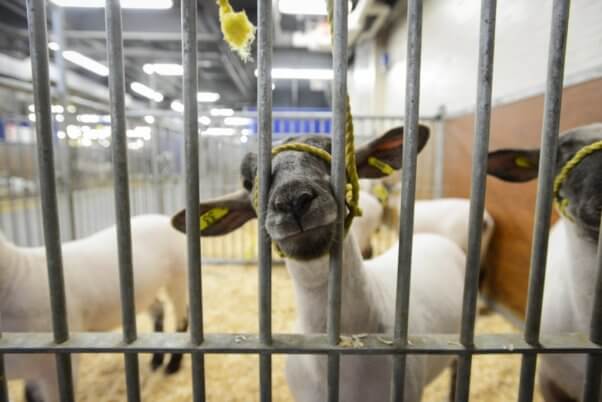
TeachKind hears reports of cruelty-to-animals cases involving young people nearly every week. Given the rampant bullying and youth violence in schools as well as the alarming cases of young people abusing animals that regularly appear in the news, it’s vital and timely that a standard of compassion be set in all schools—and that students be taught to understand that violence toward any living being is wrong. This should absolutely include the violence inherent in sending an animal to slaughter.
Using animals as “teaching tools” in school projects leaves them vulnerable to abuse, and programs like FFA and 4-H ultimately teach kids the dangerous lesson that animals are nothing more than items that can be bought, sold, and slaughtered.
Animals Are Worth More Than Their Parts
Just like the cats and dogs many of us share our homes with, pigs, cows, chickens, and other animals are sensitive, thinking individuals who value their lives and feel pain, fear, joy, and love. They’re terrified by the sights and smells of the slaughterhouse, and they don’t want to die. Anyone, including children, would be horrified if someone asked them to send their family dog or cat to slaughter, because there is a bond, a mutual love and trust, between them and their animal companion. And even though many children bond with the animals used in 4-H or FFA just as they would with companion dogs and cats, animal agriculture programs encourage children to be indifferent about what happens to them. This is not only cruel to the animals, who have come to love and trust the children caring for them, but also detrimental to the children—and everyone they interact with—because it teaches them to betray others for their own benefit. Some children are traumatized when they learn the horrific fates of their beloved animals. If they aren’t shamed or coaxed into suppressing their feelings, they may go to great lengths to ensure that their animal friends aren’t sent to auction.
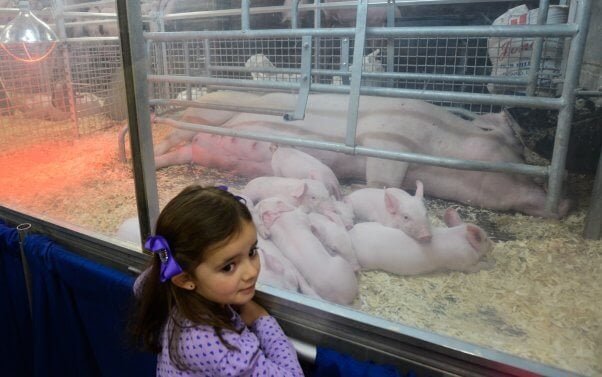
In slaughterhouses, chickens’ fragile legs are slammed into metal shackles and they’re hung upside down before workers slit their throats. Pigs are dumped into tanks of scalding-hot water—often while they’re still alive because of improper stunning—and cows are hoisted upside down by the hind legs and dismembered, sometimes while they’re fully conscious.
Animals don’t belong to us, and they value their lives and families just as we value ours. A culture in which the manipulation, exploitation, and slaughter of animals is standard practice is one that views them as possessions, products, and commodities instead of individuals who experience feelings, belong to families, and form friendships. Widespread institutionalized violence will continue as long as humans view living, feeling animals as objects and poison children’s minds to think the same. Schools should be teaching students to be more aware of and sensitive to the needs of others, not to turn a blind eye simply because they’re told to do so.
If You Love Animals, You Don’t Sell Them to Be Killed
When young people join 4-H or FFA, not all of them realize that the animals they’ll spend months caring for and bonding with will eventually be sold into an exploitative and deadly industry. We’ve heard from numerous students who were heartbroken to find out that the animals they’d grown to know and love would be sold to be killed. Here are the stories of two of them who refused to turn their backs on the animals they’d befriended:
- Alena Hidalgo of Pearland, Texas, spent months getting to know Gizmo, the pig she had purchased through FFA. It didn’t take long for the two to bond as she played with and cared for him every day. She saw him as the unique, sentient, intelligent individual he was—not as food or a product. So when the time came to send her friend to slaughter, she knew she had to do everything in her power to save him.
Alena raised her voice in defense of Gizmo for weeks. Along with her friend Kayree, she not only persuaded her school to let her send him to a local sanctuary but also tried to save another pig, Kurtis, who, unfortunately, was sent to slaughter by another student. At the sanctuary, Gizmo is able to spend his days enjoying life, and he’ll never be slaughtered. As for Alena, she decided to go vegan and quit FFA.
- Bruno Barba of Fullerton, California, joined the FFA program at his high school and bought a young pig from a feedlot, naming her Lola. He learned how to take care of her—feeding her, cleaning her living area, and walking her, all according to FFA’s plan. But as time passed and he got to know her unique, loving personality, he became anxious about her fate. The pivotal moment came when he saw student-hired butchers slaughtering the cows he’d come to know over the past few months. He realized that the animals deserved better, and he couldn’t betray Lola, knowing she would follow him anywhere—even unknowingly to a bloody, painful slaughter.
Instead of sending Lola to a butcher or condemning her to life in a concrete pen, Bruno found her a new home at Farm Sanctuary in Watkins Glen, New York, where she can enjoy the rest of her life with other pigs and play in the grass and mud. Neither he nor his awesome mom could look at meat, eggs, or dairy as food again, so they switched to vegan eating.
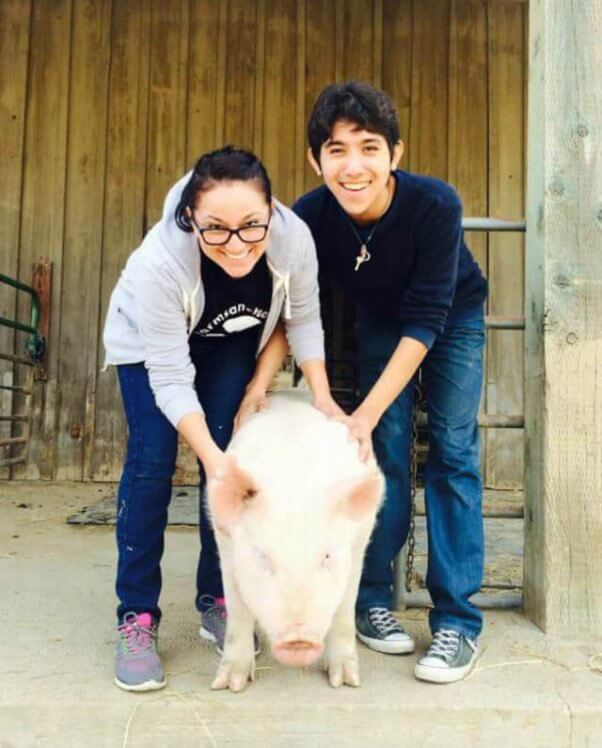
The Heartbreaking Reality of Lost Battles
There are many cases in which children try to spare their animal friends the gruesome fates awaiting them, but, sadly, they don’t always have happy endings, no matter how bravely and persistently the child calls for adults to do what’s right. Such was the case with 9-year-old E.L. and her beloved goat, Cedar. After auctioning him off at a county fair, as most children do in animal agriculture programs, E.L. had a change of heart and didn’t want him to be slaughtered. With the help of her mother, she offered to forfeit the prize money she had won in exchange for his life and even drove her friend to a safe haven hundreds of miles away in an attempt to save him. But the hardened heart of the fair’s livestock manager couldn’t be softened, and he had the police seize the goat and deliver him to be slaughtered. Even though E.L. and her mother sued the County of Shasta and Shasta County Sheriff’s Office over this injustice and won $300,000 in an incredible victory, it’s too late for Cedar, whose life could have been spared if only the adults involved would have had compassion for him and E.L. instead of cruelly slaughtering him for their own profit.
There’s No Excuse to Abuse Animals
None of the cruelty inflicted on animals and children in the stories above needed to happen. No one needs to eat animals. Vegan eating is the most humane, sustainable, and healthy choice. 4-H, FFA, and other agricultural programs could easily end their cruel practices and focus instead on the ethical and universally beneficial activities they already promote, including gardening, expressive arts, and leadership programs. There is no justifiable reason for schools to support the cruel, greedy animal agriculture industry, traumatizing children, teaching them harmful lessons, and horrifically slaughtering vulnerable animals instead of helping young people grow into compassionate, responsible individuals who will make the world a better place for everyone.
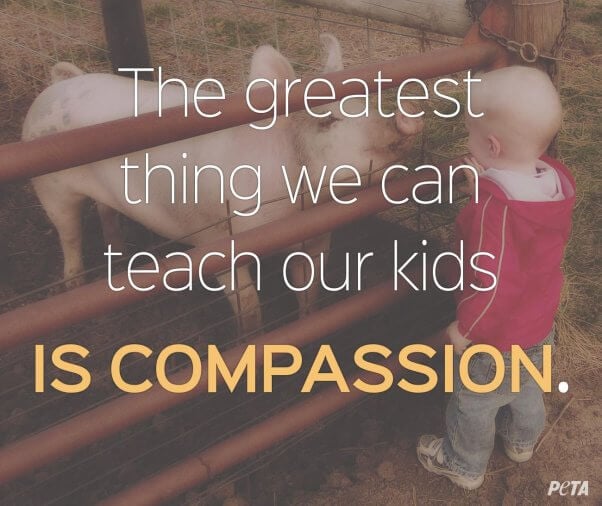
It’s vital to teach kids to respect animals for the interesting sentient beings they are instead of focusing on how they can be of use to humans. Students should be taught to stand up for others who need help—not to stand by quietly as a living being they’ve grown to love is sent to be killed.
If you live near a participating animal sanctuary, you can encourage high school students to take part in the Leaders for Ethics, Animals, and the Planet (LEAP) program, which is a compassionate alternative to 4-H and FFA programs that harm animals. They’d have many of the same opportunities that other agriculture programs offer—working with other students from around the region, participating in local events, learning from experts and mentors, receiving financial compensation for their work, and, of course, spending time with the animals—without being encouraged to disconnect from their empathy for other sentient beings and forced to allow the animal they’ve cared for and bonded with to be killed for food. If you’re not near an existing LEAP program, find out how to start one in your area!

